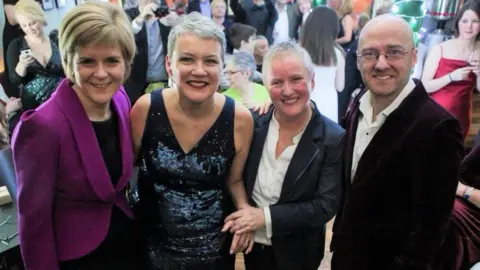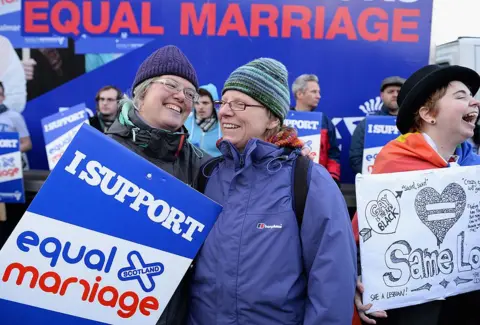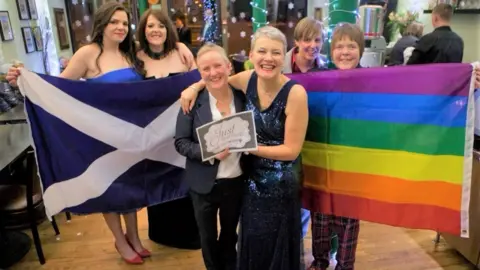Ten years and 10,000 weddings: How same-sex marriage changed Scotland
 Elaine Livingstone
Elaine LivingstoneExactly 10 years ago, a change in Scots law meant same-sex couples could marry for the first time.
The Marriage and Civil Partnership (Scotland) Act 2014 came into effect on 16 December 2014 and brought Scotland in line with England and Wales, where couples had been able to marry since March.
The change came after years of campaigning and debate and the first ceremonies took place later that month.
Between then and the end of September this year, 10,138 same-sex couples have gone on to marry.
The bill was first introduced in the parliament in June 2013 and the final debate and vote was held on 4 February 2014.
It was approved with 105 MSPs voting in favour and 18 opposed, with no abstentions. Of those who voted against the bill, seven were members of the SNP, eight were Conservatives and three were Labour MSPs.
The vote was won under Alex Salmond's leadership but Nicola Sturgeon was first minister when the law changed. She believes passing the act is one of Holyrood's five most important achievements.
She said: "I think it was a really special moment for the parliament, for Scotland. It said something, I think, really positive about the kind of country that modern Scotland is."
Scottish Green Party co-convener Patrick Harvie remembers with fondness the moment the vote was announced.
"There was a very, very special moment right at the end of the final debate. They're not supposed to do this but some of the campaigners in the gallery stood up and applauded and the MSPs stood up and applauded back to the campaigners," he said.
"There was this real moment of feeling that we were doing what some of the devolution campaigners wanted - a parliament that shares power with the people".
 Getty Images
Getty ImagesTwo weeks after the change, the first weddings under the new law took place just after midnight on 31 December 2014.
Susan and Gerrie Douglas-Scott's wedding was one of these. They had been together for 18 years before they were able to marry.
They tied the knot in Glasgow, with their friends Nicola Sturgeon and Patrick Harvie acting as witnesses.
Ten years on, Susan and Gerrie still talk about the excitement of that night and the difference it made to their lives.
Susan said: "It has made us think even more about the importance of equality in Scotland. For us as Scots.
"Being on an equal footing with everybody else's relationship has helped us present that to the world in a different way. In a kind of shinier, more beautiful way.
"We always felt that ourselves, privately, but I think just being allowed to say it to the world," she added.
Gerrie feels their marriage marked an enormous change in how they were able to live their lives.
"We've gone from the 90s, when we were scared to lose our children, to come out and lose our children, and to having a secret ceremony on a little boat on the River Tay, through to [it] couldn't have been more public ten years ago, and celebrate not just us but a fairer Scotland.
"It really was about Scotland being a fairer place, more equal place, acknowledging our human rights, acknowledging that love comes first".
'All politics is personal'
For Nicola Sturgeon, attending her friends' wedding in her constituency brought home the importance of the act.
"It was really emotional, both of their families were there. And there was a lot of love, a lot of emotion, in the room. And there was a lot of good fun as well," she said.
"It was a really special way to mark something that was a big political moment and it was also a reminder that all politics is personal.
"This was a piece of legislation, passed in a parliament in Edinburgh, that literally changed the lives of many couples across the country".
Patrick Harvie said: "Far more important than the debates in parliament is the reality of people being able to tie the knot in the way that they want.
"And it is a really important signal to the younger generation that their relationships are valued every bit as much as those of their neighbours".
For Gerrie and Susan, who both work as humanist celebrants, their experience gives them the chance to help younger people taking a similar journey today.
"We're history now. We're historical artifacts," Gerrie said.
 Elaine Livingstone
Elaine LivingstoneAnalysis of the National Records of Scotland's figures up to the end of September this year shows that same-sex marriages have taken place in all 32 of Scotland's local authorities.
The council area with the highest number was Edinburgh with 1,853. Glasgow came second with 1,402 while Dumfries and Galloway came third with 1,379, thanks to the appeal of Gretna as a marriage destination.
The months of July, August and September are the most popular for a wedding.
So much changed a decade ago but the story of same-sex marriage in Scotland did not end on Hogmanay 2014.
It took a further eight years for the Church of Scotland to decide it would allow its ministers to conduct same-sex services.
The much smaller Scottish Episcopal Church made the change in 2017.
The Catholic Church opposed the change and does not recognise or perform any sacramental marriages between same-sex couples.
However, Pope Francis has allowed priests to bless same-sex couples under certain circumstances.
The last part of the United Kingdom to legalise same-sex marriages was Northern Ireland, where the law changed on 13 January 2020.
